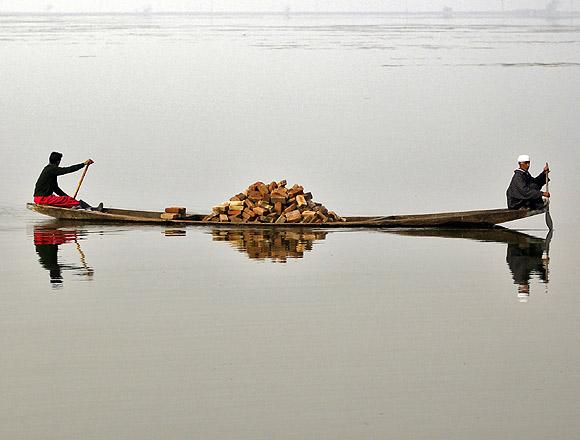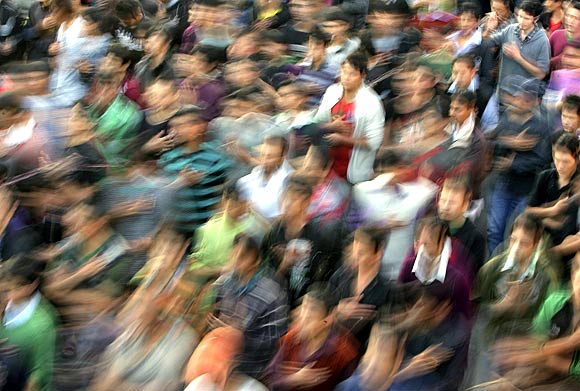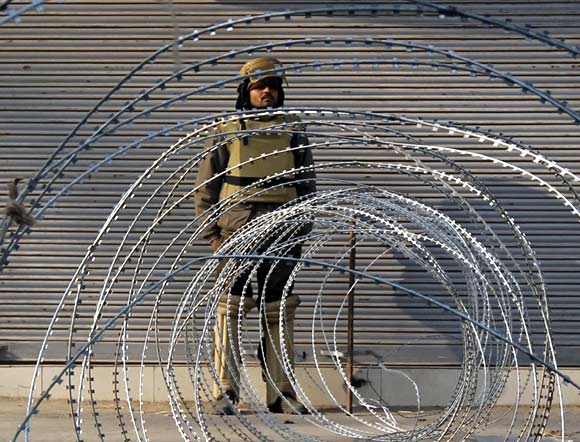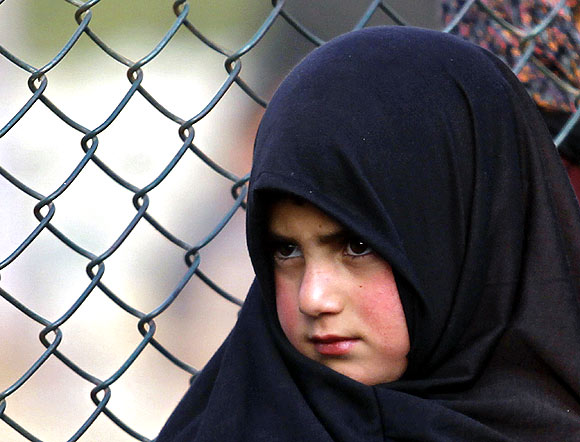Photographs: Fayaz Kabli/Reuters
The step towards truth and reconciliation will be a step towards justice and ultimately, towards peace in the Valley, writes Varad Varenya
The people of Kashmir valley are wounded physically, socially, culturally and psychologically due to the long turmoil. The afflictions are deeply engraved in the hearts and minds of the people. Kashmiris (living on both the sides of tunnel) are left with only questions.
Questions which haven't been answered till date; questions which are directly related to the lives of people, questions about human rights, justice and truth. Already many years have passed; it is high time we seek answers. The answers need to be sought.
So many lives lost; so many disappeared; so many hounded out of their homes and what not! As per the Jammu and Kashmir government, 43,460 people have been killed in Kashmir insurgency in the last 21 years (January 1990 - April 2011).
Of these, 21,323 are militants, 13,226 are civilians killed by militants, 3,642 are civilians killed by security forces and 5,369 are policemen killed by militants.
Unmarked graves have invited more questions
Image: A Moharram procession in SrinagarPhotographs: Mukesh Gupta/Reuters
According to the figures available with the government, 27,000 women were widowed and 22,000 children were orphaned during militancy. But figures provided by independent sources are higher than these government figures.
According to Professor Bashir Ahmad Dabla, head of the department of sociology, University of Kashmir, there are 32,400 widows and 97,000 to 1,00,000 orphans in the valley.
As per the Jammu and Kashmir Coalition of Civil Society, more than 70,000 people have been killed in Kashmir since 1989; nearly 8,000 people have disappeared; at least 25,000 children have been orphaned.
The Jammu and Kashmir State Human Rights Commission's recent report on unmarked graves in Kashmir have invited more questions. More than 2,000 unmarked graves were found in Baramulla, Kupwara, and Bandipore districts of north Kashmir. Nearly 3,800 unmarked graves have been reportedly found in Poonch and Rajouri districts.
The truth should come out
Image: A policeman stands guard behind a barricade in SrinagarPhotographs: Fayaz Kabli/Reuters
Many people in the Valley believe that there is a possibility that people who have disappeared are buried in the graves. It should be noted that unidentified foreign militants who were killed in the Valley by security forces are also buried in unmarked graves. Another possibility is that some of those who disappeared may be living across the border.
At the same time, the recent report cannot be negated. Whether the buried bodies are those of terrorists or civilians, the truth should come out.
The Jammu and Kashmir State Human Rights Commission has directed the state government to constitute an "independent, duly representative, credible, structured and fully empowered" body to "investigate and identify the people buried in unmarked graves and to prosecute the perpetrators".
The long-standing issue of the return and rehabilitation of the exiled Kashmiri Pandits (without any compromises on their religious identity, safety and their political interests) ought to be addressed.
Nearly four lakh Kashmiri Pandits were hounded out of their homes due to this turmoil and thousands were killed. Some put the present figure of the number of exiled Kashmiri Pandits at 7.5 lakh. No commission or probe has focused on ethnic cleansing and the genocide of minority Pandits, which led to their exodus from the valley. Moreover, the persecutors are roaming free in Kashmir.
Kashmir needs justice irrespective of religion
Image: A girl watches a procession in SrinagarPhotographs: Fayaz Kabli/Reuters
The veil over bitter truth needs to be lifted. The facts need to be produced and presented to the people. And on the basis of facts, justice must be delivered.
A Truth and Reconciliation Commission can be a step towards finding the facts and in building the confidence of the people in democratic institutions of the state.
It has been almost eight months since Chief Minister Omar Abdullah backed the idea of constituting a Truth and Reconciliation Commission to look into the killings, disappearances and internal displacement of people in Kashmir.
Nothing has been done on the ground to set up the commission. The onus lies on the state government to start such a commission and the Centre should provide all necessary help for it.
The approach should be in the direction of justice. The step towards truth and reconciliation will be a step towards justice and, ultimately, towards peace.
Kashmir needs justice irrespective of religion, caste or creed. The wounds need to be healed. The wounded lives need a closure. More than two decades have passed. As justice delayed is justice denied, do not delay justice anymore.
Varad Varenya is a Delhi-based writer





article